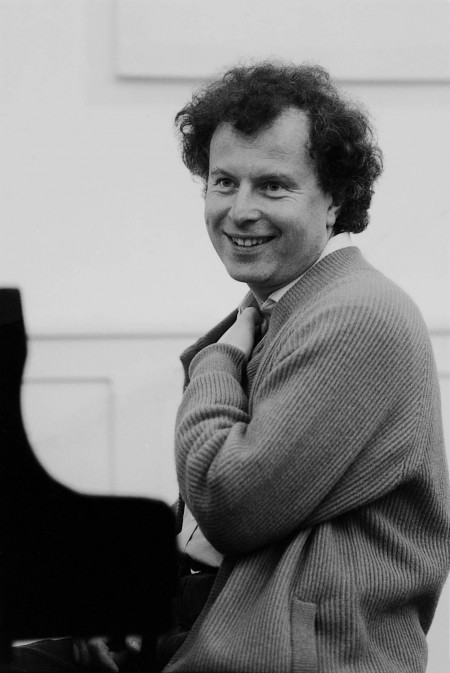21 December 1953, Budapest
He is one of the most outstanding pianists of international rank of his generation. He grew up in a family of no musicians though his mother attended the Academy of Music at the piano division. He began learning to play the piano at the age of five as a student of Erzsébet Vadász. In 1968, at age fourteen he won the 'Ki mit tud', a talent search broadcast of the Hungarian Television that made his name renown nation-wide. He was admitted to the Academy of Music the same year, where his professor was Pál Kadosa in that legendary period when among others Jenő Jandó, Zoltán Kocsis and Dezső Ránki were also students of Kadosa. He studied chamber music with György Kurtág and Ferenc Rados. He came into contact with the famous British pianist and harpsichordist George Malcolm still as a student of the Academy, at whom he pursued advanced studies regularly for a long time. Decisive professors of his career were also: Ilonka Kabos, Albert Simon, Amadeus Webersinke, Tatiana Nikolayeva and Bella Davidovich.
Following his studies at the Academy he became a soloist of the National Philharmonic Society that provided him with performance practice. At the same time he undertook chamber music instruction at the Academy of Music for two years. His international career began to unfold in the middle of the 1970s already in such important countries as Great Britain, United Stated (on a tour with János Ferencsik and the State Concert Orchestra) or Japan.
He moved to London in 1979, though he stayed regularly in New York, as well. He became more and more famous and gained enormous success with his recitals in the programs of which he included great cyclic works, or parts of oeuvres (ex. Bach: Das Wohltemperierte Klavier, entire sonata cycles of Mozart or Schubert, etc.) He was mentioned as a successor of Glenn Gould after his Bach-performances by critics. The main works in his repertoire were those of Bach, Haydn, Mozart, Schubert and Bartók at that time, later supplemented with the works of Beethoven, Schumann, and further Romantic and several of the twentieth century composers. He performed chamber music with more and more artists of world-fame (among others Sándor Végh, Miklós Perényi, Gidon Kremer, the Julliard and the Guarneri Quartets, Rudolf Serkin, Mieczyslaw Horszowski and with conductors György Solti, Zubin Mehta, Bernard Haitink, and Kurt Masur). He has an outstandingly important professional relationship with the Swiss oboist and conductor Heinz Holliger. He prefers performances with singers since the beginning of his career as a partner of ex. Peter Schreier, Dietrich Fischer-Dieskau, Juliane Banse, Robert Holl, László Polgár, Barbara Hendricks and more recently Cecilia Bartoli.
He moved to Salzburg in 1986 and established the ‘Mondsee' Festival - focusing on chamber music and held in the period following the Salzburg Festival - in 1989, which he was leading for ten years and became very popular. He had a key role in the events at Feldkirche called ‘Schubertiade' for more than one and a half decades. Recently he has been organizing a music festival in Vicenza in relations with the Teatro Olimpico.
András Schiff has been living in Florence since 1996. He has been working also as a conductor more and more frequently in the recent years besides his activities as a pianist. In 1999 he founded the chamber orchestra called ‘Camerata Andrea Barca'. The cultivation of the intellectual heritage of Sándor Végh is of paramount importance in the artistic conception of the ensemble.
András Schiff made a large amount of recordings as an exclusive artist of the labels Decca and Teldec, several of which were awarded prestigious recognitions (ex. three Grammy Awards). András Schiff was awarded the Bartók Béla–Pásztory Ditta Prize in 1991, the ‘Claudio Arrau' Medallion in 1994, the Kossuth Prize in 1996, and the ‘Leonie Sonnings' Prize in 1997.
M. J.



